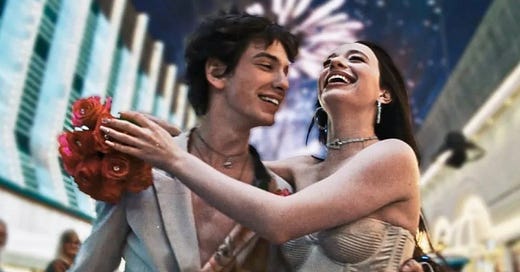Sean Baker, director of Anora, tells stories about people on the fringes. Take Out depicted a day in the life of an undocumented Chinese immigrant in New York. In Tangerine, he followed two trans sex workers in L.A.. Anora, his latest, concerns a stripper who meets the son of a Russian oligarch and starts up a relationship with him. When the boy’s father finds out, he sends some goons to break up the union. Chaos, predictably, ensues.
The eponymous Anora (Mikey Madison) – ‘Ani’ – is 23 years old and living in Brighton Beach, a Russian-American neighbourhood in Brooklyn. At the club where she works, she is introduced to Ivan ‘Vanya’ Zakharov (Mark Eidelstein) because she speaks Russian and his English is close to non-existent. Vanya is 21 and the son of a billionaire. He looks a bit like Timothée Chamelet, or a young Gaspard Ulliel. He is, at least in theory, in the United States to study. In practice, he is partying, playing video games, and smoking quite a bit of weed in the family mansion. Not hugely original characterisation, but we move.
Stripping alone won’t do for Vanya, so he starts to pay Ani for sex. He soon grows fond of her: he gives her fifteen grand to stay with him for a week. She says yes; it is good money. I would take it if I were her. And the pair have fun. They go to Vegas with Vanya’s hangers-on. They drink, they dance. And then Vanya, set to go back to Russia to work for his father, makes Ani an offer. Marry me, he says, so I can get a green card and stay here. Also: I love you. And Ani buys it. So Ani and Vanya get hitched in a Vegas wedding chapel. She quits her job and moves into the mansion. And when the family back in Russia hear the news, they go spare. Vanya’s godfather, Toros (Karren Karaguilan), is swiftly dispatched to arrange an annulment and talk some sense into the kid. Vanya’s father and mother will fly over at once.
What follows is something like a drawn-out version of people running around to the theme from Benny Hill, only punctuated with spiky, defiant tawk from our Brooklynite heroine and that kind of ‘da, da’ gruff Russian you hear in English-language films. Anora makes life as trying as possible for the henchmen charged with making her behave. Garnick (Vache Tovmasyan) and Igor (Yura Borisov) arrive at Vanya’s pad and find his new wife is a handful. She kicks, she bites, she calls them names. She questions their virility. They make fun of each other for failing to deal with the ‘little girl’, only – again, predictably – to be embarrassed themselves. There is a long slapstick sequence at the pad that ends with the place in pieces.
I don’t know about you, reader, but I am not wild about slapstick, and there is quite a bit of it in Anora. There is a point at which one of the goons actually slips on ice and falls over, à la Looney Toons. And are we not past finding it funny when non-English speakers struggle to speak English? It has often been said that most English-speakers can barely speak English, let alone a second language. Anora describes itself as a ‘comedy-drama’, but the stress after the first forty minutes is very much on the comedy, and it isn’t of the laugh-till-you-cry variety. Or even the laugh variety.
If I were feeling charitable, I might say that there is something mildly interesting about the marriage (as it were) of this family-friendly style of comedy with the more ‘mature’ themes with which the movie grapples. That is, in its way, subversive, just as Ani’s defiance of expectations is, in our culture, subversive. Anora presents a nuanced depiction of sex work, and Ani not as someone to be saved but a woman with a say. Perhaps these incompetent henchmen (were they really the best ones available?) stand for a neanderthal patriarchy seen to keep smart if vulnerable women down.
Perhaps. But the film has wider resonance. For Ani’s experience with Vanya is wholly and explicitly transactional, and transactional relations are not unique to those in sex work. A common charge made against our culture (by Patrick Deneen and the other ‘post-liberals’ in particular) is that liquid modernity commodifies us. Everything is for sale. Hence the exodus from dating apps: no one wants to feel she is in the shop window, perused by passers-by like a pair of new shoes. It puts me in mind of Terry Eagleton, the Marxist critic, who asks somewhere, rhetorically, if our highest aim is really just for a world like ‘now, but with more options’.
The problem here is that one has to draw these themes out of Anora. Watching it these are not the thoughts that come to mind. What comes to mind is mild puzzlement at how a film that starts with such promise could so fast become dull and so fantastically unfunny. And in any case, a film is not good because it has something to say or tackles big themes (despite what people claimed about the overpraised Crash). Filmmaking is a craft. It is not the what but the how that counts. Obviously.
Speaking of how – a word on the cinematography. Drew Daniels, so little-known he does not even have a Wikipedia page, brings a beauty and elegance to settings that might otherwise be gritty and grungy. This, side by side with Madison’s nuanced performance, dignifies the title character who, by dint of her job, might otherwise be seen as a victim or damsel in distress, a ‘category’, and not a young woman with agency and character and style.
So Anora isn’t awful, by any means. Mikey Madison does her job brilliantly, evincing a vulnerability behind her shouty, truculent persona, and thanks to Daniels, the film’s sundry settings – the strip club, the lad-pad, the casino – are easy on the eyes. But the comedy is cringeworthy, toe-curling stuff, and there is little to redeem the film after the first three-quarters of an hour. I can see what Sean Baker, a sensitive and interesting filmmaker, was going for. But slapstick Cinderella isn’t for me.






I'm used to seeing "comedies" where incompetent henchmen kill people accidentally, so the slapstick perfectly offset my sense of dread. And I don't want films to make meaning obvious as I'm watching, I'd rather mull over them for years. I love Anora more now than I did while I watched it, and that's a win for me.
This is to harsh of a review.